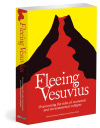 Feasta’s book Fleeing Vesuvius: Overcoming the Risks of Economic and Environmental Collapse draws together many of the ideas our members have developed over the years and applies them to a single question – how can we bring the world out of the mess in which it finds itself?
Feasta’s book Fleeing Vesuvius: Overcoming the Risks of Economic and Environmental Collapse draws together many of the ideas our members have developed over the years and applies them to a single question – how can we bring the world out of the mess in which it finds itself?
The book confronts this mess squarely, analysing its many aspects: the looming scarcity of essential resources such as fossil fuels – the lifeblood of the world economy; the financial crisis in Ireland and elsewhere; the collapse of the housing bubble; the urgent need for food security; and the enormous challenge of dealing …






